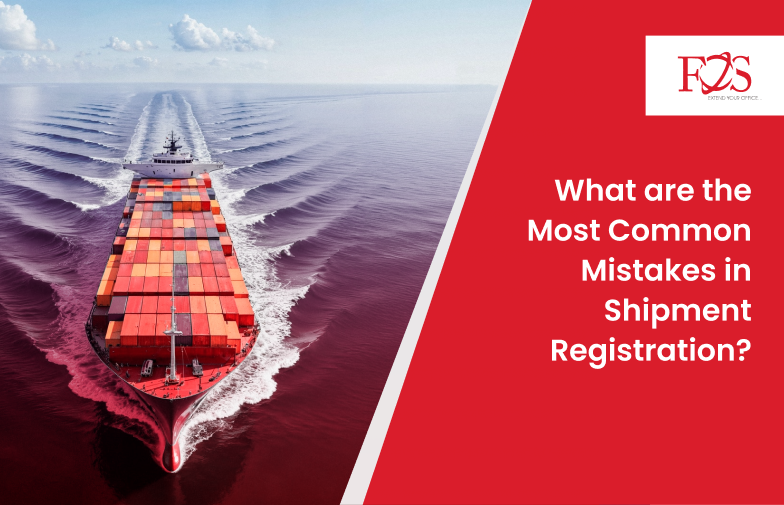If you’ve ever managed logistics documentation or shipping operations, you know how easily a small error can delay an entire supply chain. Shipment registration, while seemingly straightforward, is often riddled with hidden inefficiencies and manual bottlenecks. These problems not only cost time but can silently eat into your margins.
In this blog, we’re diving deep into the most common mistakes businesses make during shipment registration, why they happen, and how outsourcing to a logistics BPO service can help simplify the process for better financial outcomes.
1. Incomplete or Incorrect Documentation
This is one of the biggest culprits behind shipment delays. A wrong HS code, a missing invoice, or a mismatched bill of lading can result in penalties or stuck cargo at the port.
If your team is manually preparing documentation, the risk of human error naturally increases. For many U.S.-based businesses, this leads to higher demurrage fees, longer lead times, and damaged client relationships.
2. Misunderstanding Country-Specific Regulations
Different countries have different customs documentation and compliance rules. Even within the U.S., port-specific requirements can vary.
Without experienced staff or a supply chain BPO partner, your business might unknowingly miss these nuances. A 2023 report by Logistics Management found that 41% of shipping delays were linked to regulatory compliance issues.
3. Lack of Real-Time Tracking of Registration Status
Shipment registration isn’t just about sending forms. It involves real-time coordination with multiple stakeholders like carriers, freight forwarders, port authorities, etc.
Many companies lack visibility into where their documentation is in the approval cycle. A logistics BPO service can fill this gap by maintaining ongoing communication and updates, especially when operations scale.
4. Over-reliance on Manual Workflows
Are your internal teams juggling spreadsheets, emails, and shared folders for shipping data? That is not uncommon, but it is a risky move.
Manual shipment registration slows down processing and increases error rates. According to Deloitte, manual documentation processes are 4.5 times more likely to contain errors than standardized workflows managed through outsourced back offices.
5. Delayed Data Entry and Updates
Once shipment data is received, updating it on your internal systems or sharing it with freight partners must be immediate. Yet in many organizations, this task is pushed to the end of the day, or worse, forgotten altogether.
Late data entry can lead to missed cutoffs, detention charges, and inventory misalignment, all of which directly impact your bottom line.
6. Miscommunication Between Departments
Finance, sales, and logistics often operate in silos. A missed internal handover or an uninformed team member can result in inaccurate shipment details being registered.
Outsourcing to a BPO in logistics bridges this gap. BPO teams work as centralized support hubs, ensuring all departments stay informed, compliant, and aligned.
7. No Quality Checks in Place
Many companies don’t implement pre-submission checks before sending out shipping documentation. A second pair of eyes can make a big difference, especially for high-volume exporters.
Logistics BPO services typically include multi-tiered quality control to catch and correct these issues before they escalate into serious problems.
8. Lack of Staff Training or Domain Knowledge
Your internal team may be efficient, but if they’re not trained on logistics-specific best practices, mistakes are inevitable.
A specialized logistics BPO service provider offers access to trained professionals who deal with shipment registration daily. They bring not just speed but accuracy, reducing the learning curve for your business.
9. Ignoring Peak Season Volume Surges
During seasonal spikes or promotional campaigns, documentation volumes can surge. Unfortunately, many businesses don’t scale their back-office support accordingly.
This leads to delayed registrations and possible port congestion. Working with a scalable supply chain BPO partner ensures you never miss deadlines, even during unexpected spikes.
10. Failing to Audit Past Errors
Do you review rejected registrations or customs holds regularly? If not, you’re likely to repeat the same mistakes.
BPO in logistics not only handles registrations but also maintains reports and audits. This helps you identify patterns, correct recurring issues, and fine-tune your operations for long-term savings.
Why It Matters for Financial Decision-Makers Like You
Every error in shipment registration translates to operational delays, financial losses, and compliance risks. For financial heads and supply chain managers in the U.S., these issues affect cash flow, customer satisfaction, and even brand reputation.
Outsourcing your shipment registration tasks to a logistics BPO company provides a strategic advantage. You’ll benefit from faster turnaround, trained documentation professionals, 24/7 support, and cost efficiencies of up to 40%, depending on volume and complexity.

Conclusion: Avoid Mistakes and Save Big
Shipment registration may sound like just another box to check, but for your business, it’s a critical component of operational efficiency and cost control. Even one small error can create ripple effects across your entire supply chain.
By partnering with a logistics BPO service, you not only reduce the burden on your internal team but also eliminate errors, minimize delays, and unlock hidden savings in your documentation process.
Ready to fix these mistakes and run a tighter ship?
👉 Check our Shipment Registration service to see how our logistics back-office solutions can simplify your shipment registration process.
Frequently Asked Questions (FAQs)
1. How can outsourcing shipment registration reduce errors?
Outsourcing to a logistics BPO ensures that experienced professionals handle your documentation. They follow strict QC protocols, cross-check every submission, and reduce the chances of manual errors and delays.
2. What kind of companies benefit the most from logistics BPO services?
Medium to large-scale exporters, freight forwarders, and 3PL providers who deal with high shipment volumes see the most value. Especially businesses that lack in-house logistics expertise or want to scale cost-effectively.
3. Is shipment registration only about documentation?
No, it also involves coordination with carriers, regulatory compliance, tracking submission status, and often managing last-minute changes. That’s why it’s ideal to outsource it to a team that’s built for speed and precision.
